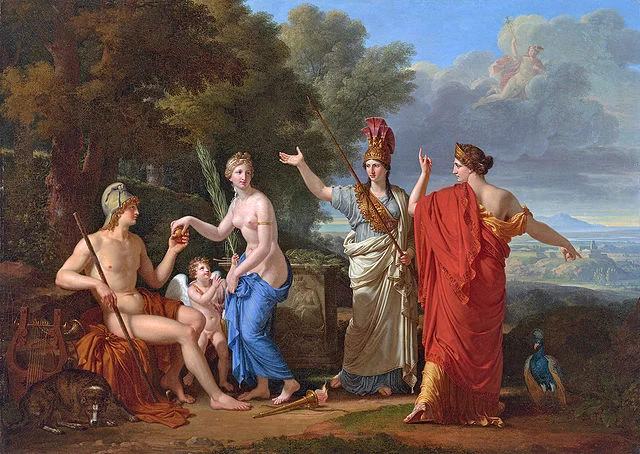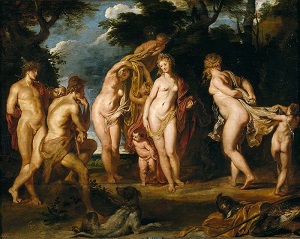The Judgement of Paris: In Greek mythology, the Judgement of Paris is a story that centers around a beauty contest between three goddesses: Aphrodite, Hera, and Athena. The contest was judged by a mortal man named Paris, who was asked to choose the most beautiful goddess among the three. The tale has been depicted in numerous works of art and literature throughout history, and it continues to capture the imagination of people to this day.
The Origins of the Judgement of Paris:

The story of the Judgement of Paris is believed to have originated in ancient Greece, where it was told in various forms. According to one version of the story, the goddess of discord, Eris, was not invited to the wedding of Peleus and Thetis, and she became angry. To seek revenge, she tossed a golden apple inscribed with the words “For the Fairest” into the midst of the wedding guests.
Hera, Athena, and Aphrodite each claimed the apple as their own, and they began to argue over who was the most beautiful goddess. To settle the dispute, they decided to have a beauty contest, and they asked a mortal man named Paris to judge the contest.
Paris was the son of King Priam of Troy, and he was known for his great beauty and charm. He was asked to judge the contest because he was considered to be a fair and impartial judge.
The Contest:
The three goddesses each tried to win Paris over by offering him gifts. Hera offered him power and wealth, Athena offered him wisdom and skill in battle, and Aphrodite offered him the love of the most beautiful woman in the world.
Paris was torn between the three goddesses, but in the end, he chose Aphrodite as the most beautiful because of her promise of love. This decision would have far-reaching consequences for Paris and for the world of Greek mythology.
The Consequences:
As a reward for choosing her as the most beautiful goddess, Aphrodite promised Paris the love of Helen of Sparta, who was considered to be the most beautiful woman in the world. Helen was already married to King Menelaus of Sparta, but Paris went to Sparta and seduced her.
This act of adultery caused a great conflict between the Greeks and the Trojans, and it led to the Trojan War. The war lasted for ten years, and it ended with the destruction of Troy and the death of Paris.
The Judgement of Paris in Art and Literature:

The story of the Judgement of Paris has been a popular subject for artists and writers throughout history. One of the most famous depictions of the story is the painting by Peter Paul Rubens, which shows the three goddesses standing before Paris. Rubens’ painting is notable for its vibrant colors and dynamic composition.
Another famous depiction of the story is the sculpture by Antonio Canova, which shows Paris holding the golden apple and looking at the three goddesses. Canova’s sculpture is notable for its graceful lines and elegant proportions.
The story of the Judgement of Paris has also been the subject of numerous works of literature, including the epic poem “The Iliad” by Homer. In “The Iliad,” the Judgement of Paris is presented as the cause of the Trojan War, and it is seen as a symbol of the destructive power of desire.
The story of the Judgement of Paris is a timeless tale of beauty and conflict. It has been told and retold in various forms throughout history, and it continues to captivate people today. The tale serves as a warning of the dangers of desire and the consequences that can arise from our choices.
Read Also: Peter Paul Rubens
![]()




